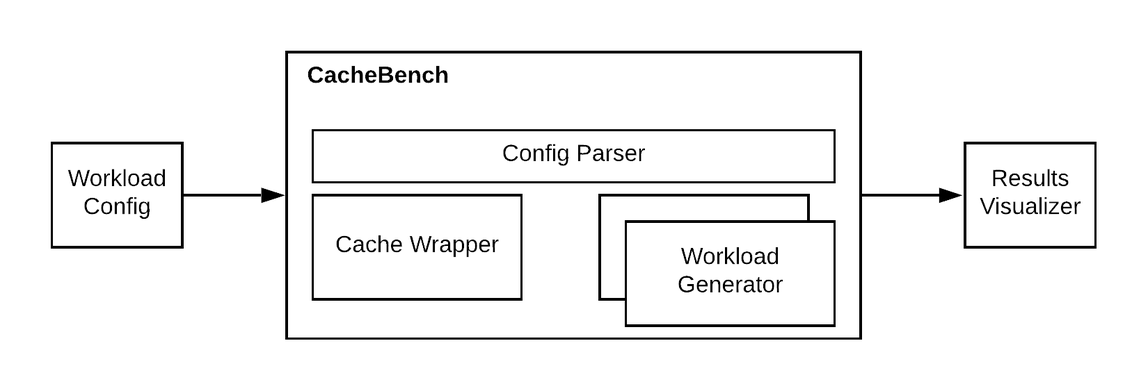Overview
CacheBench is a benchmark and stress testing tool to evaluate cache performance with real hardware and real cache workloads. CacheBench takes in a configuration that describes the cache workload and the cache configuration and simulates the cache behavior by instantiating a CacheLib cache. It runs the workload and emits results periodically and at the end. The results include metrics such as hit rate, evictions, write rate to flash cache, latency, etc. The workload configs can be hand-written by a human, produced by a workload analyzer, or backed by raw production cachelib traces. The main customization points into CacheBench are through writing workload configs or custom workload generators. See configuring cachebench for more details.

Uses of cachebench
CacheBench can be configured and used for several purposes depending on the developer's need. The following are few examples.
Prototype and evaluation of cache heuristics: CacheBench can be used to compare the cache performance (hit ratio) of various configuration options for existing hueristics and new heuristics. For example, given a cache size and workload, comparing LRU vs 2Q vs FIFO vs new heuristic added to CacheLib.
Evaluating throughput and scalability: By representing the workload in CacheBench, you can compare the throughput of various cache setups and CacheLib configuration. For example, given a workload, identifying the maximum throughput of dram cache and hybrid cache setups as you scale up number of application threads or modify CacheLib configuration.
Evaluate hardware choices: CacheBench workloads can be evaluated on various hardware choices to compare the trade-offs between them. For example CacheBench can replay the workload against a 100GB dram cache and a 10GB dram + 90 GB SSD cache to compare the sensitivity of application performance and hardware performance.
Testing for correctness and crashes: When adding new features to CacheLib, in addition to unit tests, CacheBench is leveraged to stress test the feature's correctness in a concurrent multi-threaded environment. CacheBench provides options to ensure the consistency of the cache by validating the data correctness of the operations. See configuring consistency checking on how this can be enabled. All code changes and new features to CacheLib from Facebook go through correctness stress tests with CacheBench.
Building cachebench
Follow instructions in Installation to build
cachebench. This should install cachebench in your local machine under
opt/cachelib/bin/cachebench